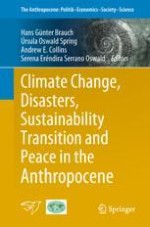2019 | Buch
Climate Change, Disasters, Sustainability Transition and Peace in the Anthropocene
herausgegeben von: Dr. Hans Günter Brauch, Prof. Dr. Úrsula Oswald Spring, Prof. Andrew E. Collins, Prof. Serena Eréndira Serrano Oswald
Verlag: Springer International Publishing
Buchreihe : The Anthropocene: Politik—Economics—Society—Science
